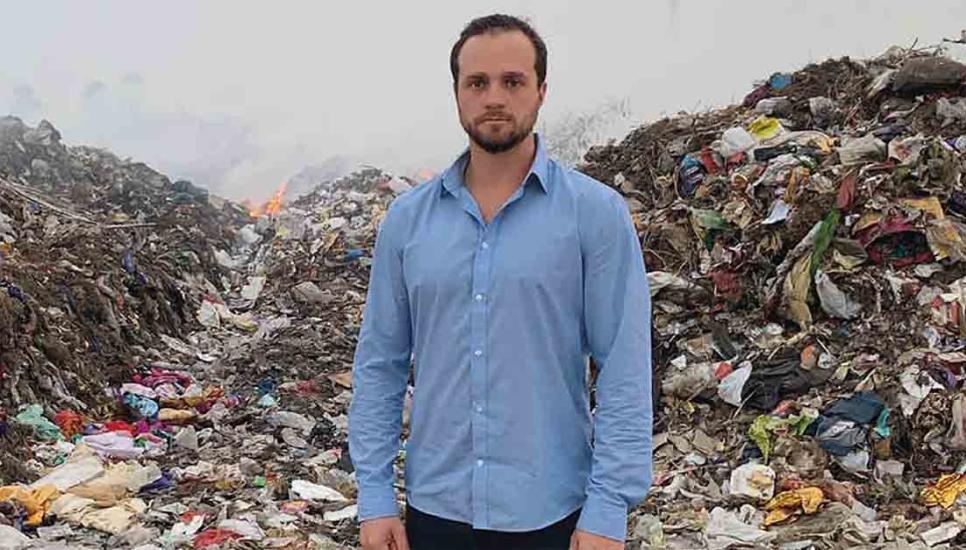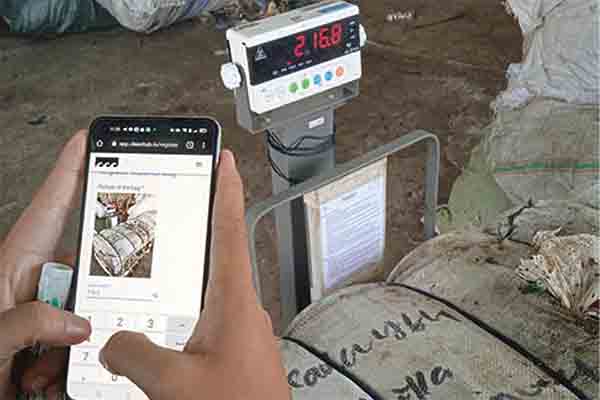Catching the wave in tackling plastic

CleanHub builds an asset-light waste management company, funded by consumer goods brands, to stop ocean plastic and enable the circular economy. Leading VC firm Lakestar talks to founder and chief executive officer Joel Tasche.
The sea has long been a source of inspiration for artists, but for one surfer it was the source of inspiration for a company.
Joel Tasche from an early age felt, in his own words, “Bound to the water” and as a teenager used to sail competitively. “Then when I turned 18 sailing was not cool anymore, so I started to surf,” he says.
He travelled to Costa Rica to improve his skills in both Spanish and surfing and became so hooked on the sport that he admits that he chose his university with an eye on being able to study abroad. As part of his studies in Intercultural Management he says he was “Privileged to spend a semester in Hawaii, where people are extremely close to nature and take a lot of care of their island.”
He soon discovered the flipside to his idyllic pastime, though. “Being in the subculture of surfing means that you’re extremely exposed to plastic pollution. It was a topic that was constantly on my social media feeds and it went even crazier in 2018/19 after China banned waste imports.”
Tasche had already dipped his toe in the corporate world, with a role in Avrios, the Zurich-based fleet management company backed by Lakestar, where he worked as righthand man to CEO Andreas Brenner. “But I realised that I really wanted to start my own company and the plastic pollution topic was always on my radar.”
Together with Bosse Rothe and Florin Dinga, Tasche founded CleanHub in 2020 as a company that could make an impact on the plastic polluting the world’s oceans and shorelines.
“My aim was to do something in the circular economy, to look for solutions that are scalable and that have impact,” he says.
CleanHub rids shorelines of plastic while at the same time allowing producers to become plastic-neutral, in much the same way that carbon credits operate. Tackling plastic pollution offers what Tasche calls an “Inevitable opportunity” for the planet.
Resources are not infinite; you need to maintain them in a circle, but the system is broken.
The economics are exponential. “The overall market of waste recycling in Germany alone is a 70-billion euro industry in a country of 80 million inhabitants. In India, you have 1.3 billion people, yet the waste management industry is just 15 billion euro, so it’s inevitable that this will grow.” Tasche says that if we are to reduce plastic pollution by around 80 per cent by 2040, we need to connect around 4 billion people to waste management services.
“Resources are not infinite; you need to maintain them in a circle, but the system is broken. We are at a unique point where the zeitgeist in Europe and the US is that of on the one side people demanding more sustainability and more responsible behaviour from companies while on the other side there is a lack of waste management in many parts of the world.”
CleanHub provides a virtual interface between the consumer goods companies that produce plastic and the waste management companies that have to deal with plastic pollution. In this way, it solves two problems at the same time. “The consumer goods industry in Europe is under immense pressure from consumers to act more responsibly. Many of these companies have only the choice of plastic to use for their packaging, and even though much of plastic is sustainable, the consumer doesn’t like it because they associate it with ocean-bound plastic.
“That is a big issue for consumer goods brands. That’s why they come to us and say, ‘We know that we're part of the problem with plastic, but we also want to be part of the solution and invest in the infrastructure that helps keep plastic waste out of the oceans’.”
So if a company produces, for example, ten tonnes of plastic packaging, CleanHub helps them attain net neutral by removing ten tonnes of plastic packaging. “We take that money that we receive from selling these plastic credits and pay local waste management organisations to divert plastic before it enters the environment,” says Tasche.
This is where the software play comes in. “We build the track and trace protocol for waste and tell the waste management companies that if they want to receive money from us they need to use CleanHub software to deliver the proof that the plastic waste was actually collected and that it was disposed of in a responsible manner. Only when we have the final point of approval, when the material is disposed of and when the laboratory confirms it is the right waste, do they receive their money.”

CleanHub also works with social auditors who visit the waste management partners to make sure the safeguards are correct. The track-and-trace app can then verify to the brands back in Europe that their investment had on-the-ground impact. This allows for complete loop and traceability of materials.
In this way, CleanHub incentivises the collection of all waste, recyclable and non-recyclable. While recyclable waste such as aluminium cans already have value, CleanHub’s business model taps into a new market and also puts value on non-recyclable material by incentivising the collection of it as well.
“There’s two types of plastic waste streams,” says Tasche. “There’s recyclable waste such as a plastic bottle. This has inherent value: it can be sold as a raw material, recycled and put back as a new bottle on the shelf without the need to invest in the primary material.
“Then, there is non-recyclable plastic waste, such as multi-layer packaging where you have a metallised inlay and a plastic outlay, like on a chips bag. These materials can’t be recycled so the only way of dealing with them is disposal. They have no inherent value which is why they end up in the oceans. Around 80 per cent of all plastic entering the sea is non-recyclable plastic.
“In Germany we have systems that take care of this. Producers have to pay a licensing fee for their packaging and that fee helps to pay the waste haulers. This sort of subsidy system does not exist in all countries. That means there’s a lack of financial means to build a functioning waste management model and there is no financial incentive to collect that stuff.”
With waste management companies adopting CleanHub’s operating model and processes, the company is able to build clusters and networks. Though their main focus is currently partnering with waste companies in Indonesia, the second-largest contributor to ocean plastic, and India, likely to legislate for a fee-based waste management system, CleanHub has also conducted successful pilots in Brazil, Tanzania, the Andaman Islands, amongst others. “Our model works anywhere,’ says Tasche. “It’s extremely fast to deploy because it’s just an app to deliver proof of work.”
The customer side is also growing, making the company active “In every continent except Antarctica”, according to Tasche. CleanHub provides consumer goods companies with communication material illustrating the clean-up projects and the impact they have and receives a margin on the plastic credit achieved. They can also showcase the green credentials to their own clients with a CleanHub logo on their packaging for an annual fee.
Tasche says that the company is about to break the one million euro accounting rate of return (ARR) mark this quarter.
The bottleneck in the market is the brands who need to step up and pay for waste management.
The plastics that cannot be recycled can be incinerated for energy, and while there are around 80 waste energy plants in Germany, India and Indonesia have none. “Instead, waste is sent to the cement industry,” says Tasche. “We have active partnerships with the two biggest building manufacturing companies in the world, HeidelbergCement and LafargeHolcim, and they have local entities in India and Indonesia. The cement industry can take toxic waste because it operates at extremely high temperatures: they combust at 1,500 degrees,” he adds. With new technologies, such as chemical recycling, on the horizon. “BASF is investing massively in these technologies and at some point they want that feedstock back. This is the beauty of our system: we can provide this feedstock.”
To date, CleanHub has diverted more than 700 metric tonnes of waste plastic with a further 1,500 metric tonnes under contract. “Compared with the 11 million tonnes of waste going into the sea, this is a drop in the ocean,” says Tasche. “But our model is highly scalable and we have access to literally hundreds of thousands of tonnes of waste. The bottleneck in the market is the brands who need to step up and pay for waste management.”
CleanHub’s go-to-market strategy focuses on Germany and the US. “The core focus of the company is to solve the funding side of things, to have more brands sign up to finance the operations,” says Tasche. There is a dedicated sales team reaching out to brands and taking advantage of being a remote-first company to cross geographies easily: currently, CleanHub employs 13 people in seven countries. It has plans to expand after its Series A financing round, which follows Lakestar’s seed investment.
Standardisation of waste management will help CleanHub in its expansion plans. “We want to become the McDonald’s of waste management with a very standardised set-up and franchises that work on the same process. We are centralising distribution of the material that is collected, thanks to waste management companies following our rules. Enforcing these rules is important as waste management is a low margin business, so you need huge volumes to be a successful company.
“The big opportunity is not the plastic credit, but the waste management industry behind it. The plastic credit is really a seed that can make the waste management industry work.”
Tasche is certainly not afraid to get his hands dirty. “I have been to more landfills than I’d like to admit,” he says. “But in the office, I can look at the numbers and see what we did today led to a slightly better world and I love that.”
This article has been published in Issue Fourteen of the Lakestar Briefing. Lakestar, one of Europe's leading VCs, has recently invested into Cleanhub.
Lakestar’s mission is to find, fund and grow disruptive businesses - enabled by technology - that are founded by exceptional entrepreneurs in Europe and beyond. Founded by Klaus Hommels, the team’s early investments include Skype, Spotify, Facebook and Airbnb. Since raising its first fund in 2012, Lakestar manages an aggregated volume of over €1.6bn across three early stage funds and a growth fund.
The team actively advises and supports portfolio companies in marketing, recruitment, technology, product development and regulatory insight, accompanying founders from seed to early stage to growth stage or exit. Lakestar currently has the privilege of holding investments in Revolut, Blockchain.com, Opendoor, Oscar, GetYourGuide, sennder, Eigen, Public.com, SoFi, Solarisbank, Uncapped, Yapily, Terra Quantum, accuRx, Rhino, ZEBEDEE and Hometogo to name a few. Lakestar has presence in Berlin, Zurich and London.
Visit Lakestar on LinkedIn and www.lakestar.com.






